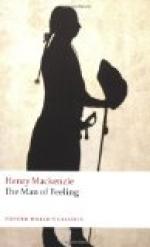But why of her charms should I tell?
Ah me! whom her charms have undone
Yet I love the reflection too well,
The painful reflection to shun.
Ye souls of more delicate kind,
Who feast not on pleasure alone,
Who wear the soft sense of the mind,
To the sons of the world still unknown.
Ye know, tho’ I cannot express,
Why I foolishly doat on my pain;
Nor will ye believe it the less,
That I have not the skill to complain.
I lean on my hand with a sigh,
My friends the soft sadness condemn;
Yet, methinks, tho’ I cannot tell why,
I should hate to be merry like them.
When I walk’d in the pride of the dawn,
Methought all the region look’d
bright:
Has sweetness forsaken the lawn?
For, methinks, I grow sad at the
sight.
When I stood by the stream, I have thought
There was mirth in the gurgling
soft sound;
But now ’tis a sorrowful note,
And the banks are all gloomy around!
I have laugh’d at the jest of a friend;
Now they laugh, and I know not the
cause,
Tho’ I seem with my looks to attend,
How silly! I ask what it was.
They sing the sweet song of the May,
They sing it with mirth and with
glee;
Sure I once thought the sonnet was gay,
But now ’tis all sadness to
me.
Oh! give me the dubious light
That gleams thro’ the quivering
shade;
Oh! give me the horrors of night,
By gloom and by silence array’d!
Let me walk where the soft-rising wave,
Has pictur’d the moon on its
breast;
Let me walk where the new cover’d grave
Allows the pale lover to rest!
When shall I in its peaceable womb,
Be laid with my sorrows asleep?
Should Lavinia but chance on my tomb —
I could die if I thought she would
weep.
Perhaps, if the souls of the just
Revisit these mansions of care,
It may be my favourite trust
To watch o’er the fate of
the fair.
Perhaps the soft thought of her breast,
With rapture more favour’d
to warm;
Perhaps, if with sorrow oppress’d,
Her sorrow with patience to arm.
Then, then, in the tenderest part
May I whisper, “Poor Colin
was true,”
And mark if a heave of her heart
The thought of her Colin pursue.
THE PUPIL—A FRAGMENT
* * * “But as to the higher part of education, Mr. Harley, the culture of the mind—let the feelings be awakened, let the heart be brought forth to its object, placed in the light in which nature would have it stand, and its decisions will ever be just. The world
Will smile, and smile, and be a villain;
and the youth, who does not suspect its deceit, will be content to smile with it. Men will put on the most forbidding aspect in nature, and tell him of the beauty of virtue.




